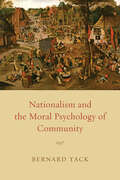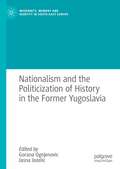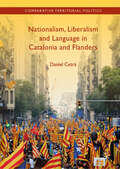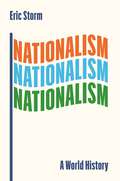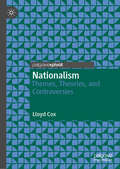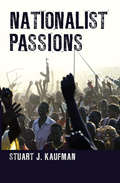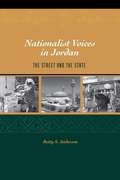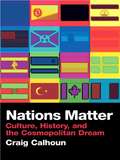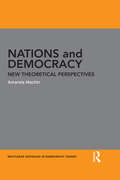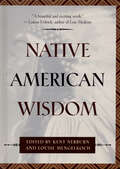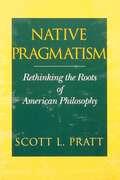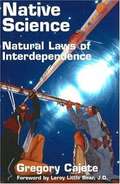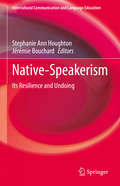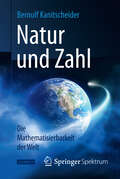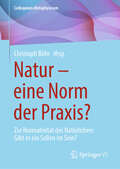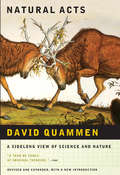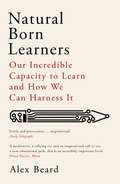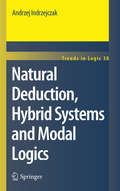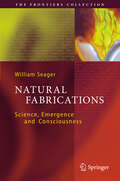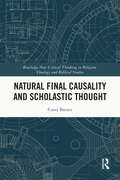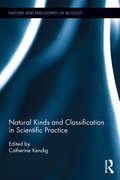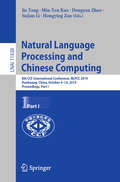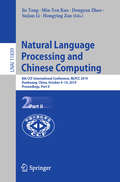- Table View
- List View
Nationalism and the Moral Psychology of Community
by Bernard YackNationalism is one of modern history’s great surprises. How is it that the nation, a relatively old form of community, has risen to such prominence in an era so strongly identified with the individual? Bernard Yack argues that it is the inadequacy of our understanding of community—and especially the moral psychology that animates it—that has made this question so difficult to answer. Yack develops a broader and more flexible theory of community and shows how to use it in the study of nations and nationalism. What makes nationalism such a powerful and morally problematic force in our lives is the interplay of old feelings of communal loyalty and relatively new beliefs about popular sovereignty. By uncovering this fraught relationship, Yack moves our understanding of nationalism beyond the oft-rehearsed debate between primordialists and modernists, those who exaggerate our loss of individuality and those who underestimate the depth of communal attachments. A brilliant and compelling book, Nationalism and the Moral Psychology of Community sets out a revisionist conception of nationalism that cannot be ignored.
Nationalism and the Politicization of History in the Former Yugoslavia (Modernity, Memory and Identity in South-East Europe)
by Gorana Ognjenovic Jasna Jozelic“This book is very timely: the instrumentalization of history for political goals has become a pressing issue and worrisome feature of many polities, to the point of challenging even the most consolidated democracies. Focusing on Yugoslavia’s fragile successor states, the authors explore plurifold analytical levels, including local, regional, transnational, European and global perspectives. The authors comprehensively demonstrate how politicizing history, in the postwar and postcommunist societies of what was once Yugoslavia, has prevented both reconciliation and democratization.”—Sabine Rutar, Leibniz Institute for East and Southeast European Studies, Germany“Ognjenovic and Jozelic focus here on the former Yugoslavia before and after its fragmentation to explore and evaluate the various uses of histories by nationalists, both those who promoted ‘federal nationalism’ and those who peddle specific local nationalisms in successor states. The book deals specifically with the Western Balkans, but these developments have their parallels in many other parts of the world, and the book will be useful well beyond the region on which the study is based.”—Paul Mojzes, Professor Emeritus, Rosemont College, USA“The former Yugoslavia has become a battlefield for the ‘Memory Wars’, in spite of the wealth of judicially established facts and available evidences gathered about the atrocities in the region, and various initiatives aimed at dealing with the past and efforts at transitional justice. Focusing on three periods of Yugoslav history – the Second World War, socialist Yugoslavia and the Yugoslav wars of 1991–2001 – the contributors show that despite these efforts to deal with the past, sustainable peace and reconciliation across ethnic and religious groups remain a distant aim.” —Marijana Toma, Center for Cultural Decontamination, SerbiaThis book analyzes how nationalists in the former Yugoslavia have politicized history to further their political agendas, retaining and prolonging conflict among different cultural and religious groups, and impeding the process of lasting reconciliation. It explores how narratives have been (mis)used, drawing on examples from all of the former Yugoslav republics. With contributors from a range of disciplinary backgrounds, it provides a vital assessment of how nationalists have attempted to (re)shape public collective memory and relativize facts.
Nationalism, Liberalism and Language in Catalonia and Flanders (Comparative Territorial Politics)
by Daniel CetràIs liberalism really compatible with nationalism? Are there limits to linguistic nation-building policies? What arguments justify the imposition of national languages? This book addresses these questions by examining the linguistic disputes in Catalonia and Flanders, two major cases of sub-state nationalism. The book connects two strands of arguments: the political arguments around contested linguistic policies, drawing on a rich set of primary and secondary sources, and the theoretical arguments around liberalism and nationalism. The study also compares the historical trajectory and political dynamics of Catalan and Flemish nationalism. It shows that the relationship between language and nationhood is politically constructed through state nation-building and minority activism. The findings highlight the relevance and pervasiveness of nationalism in contemporary social and political life. This book will appeal to scholars and upper-level students interested in nationalism, contemporary political theory, the politics of language, and comparative territorial politics.
Nationalism: A World History
by Eric StormA global perspective on the nature and evolution of nationalism, from the early modern era to the presentThe current rise of nationalism across the globe is a reminder that we are not, after all, living in a borderless world of virtual connectivity. In Nationalism, historian Eric Storm sheds light on contemporary nationalist movements by exploring the global evolution of nationalism, beginning with the rise of the nation-state in the eighteenth century through the revival of nationalist ideas in the present day. Storm traces the emergence of the unitary nation-state—which brought citizenship rights to some while excluding a multitude of &“others&”—and the pervasive spread of nationalist ideas through politics and culture.Storm shows how nationalism influences the arts and humanities, mapping its dissemination through newspapers, television, and social media. Sports and tourism, too, have helped fashion a world of discrete nations, each with its own character, heroes, and highlights. Nationalism saturates the physical environment, not only in the form of national museums and patriotic statues but also in efforts to preserve cultural heritage, create national parks, invent ethnic dishes and beverages, promote traditional building practices, and cultivate native plants. Nationalism has even been used for selling cars, furniture, and fashion.By tracing these tendencies across countries, Storm shows that nationalism&’s watershed moments were global. He argues that the rise of new nation-states was largely determined by shifts in the international context, that the relationships between nation-states and their citizens largely developed according to global patterns, and that worldwide intellectual trends influenced the nationalization of both culture and environment. Over the centuries, nationalism has transformed both geopolitics and the everyday life of ordinary people.
Nationalism: Themes, Theories, and Controversies
by Lloyd CoxThis book provides a concise, critical analysis of the key themes, theories, and controversies in nationalism studies. It offers an historically informed and sophisticated overview of classical and contemporary approaches to nationalism, as well as setting out an agenda for future research on nationalism and the emotions. In so doing, the book illuminates nationalism’s contemporary power and resilience, as manifested in the growth of far-right nationalist populism in Europe, the white ethno-nationalism of Trump in the United States, the resurgence of great power nationalism and rivalry in Asia, and the resilience of national secessionist movements in diverse parts of the planet. The widespread nationalistic responses to the coronavirus pandemic provide further confirmation of the continuing power of nationalism. All of these developments are discussed in the book, which will be an invaluable resource for nationalism scholars and students in Sociology, Politics and History.
Nationalist Passions
by Stuart J. KaufmanNationalist and ethnic conflict can take many forms, from genocidal violence and civil war to protest movements and peaceful squabbles in democracies. Nationalist Passions poses a stark challenge to extreme rationalist understandings of political conflict. Stuart J. Kaufman elaborates a compelling theory of ethnic politics to explain why ethnic violence erupts in some contexts and how peace is maintained in others. At the core of Kaufman's theory is an assertion that conflicts are initiated due to popular "symbolic predispositions"--biases of all kinds--and perceptions of threat. Kaufman puts his theory to the test in a range of conflicts. He examines some highly violent episodes, among them the Muslim rebellion in the southern Philippines beginning in the 1970s; the civil war in southern Sudan that began in the 1980s; and the Rwanda genocide of 1994. Kaufman also analyzes other situations in which leaders attempted to tame the violence that nationalist passions can generate. In India, Mahatma Gandhi mobilized an overtly nonviolent movement but failed in his efforts to prevent the rise of Muslim-Hindu communal violence. In South Africa, Nelson Mandela and F. W. de Klerk ended apartheid, but not without terrible cost--more than fifteen thousand people died while the negotiations were under way. In Tanzania, however, Julius Nyerere led one of the few ethnically diverse countries in the world with almost no ethnic violence. Nationalist Passions is essential reading for policymakers, international aid workers, and all others who seek to find the best possible outcomes for future internal and interstate clashes.
Nationalist Voices in Jordan: The Street and the State
by Betty S. AndersonAccording to conventional wisdom, the national identity of the Jordanian state was defined by the ruling Hashemite family, which has governed the country since the 1920s.<P><P> But this view overlooks the significant role that the "Arab street"--in this case, ordinary Jordanians and Palestinians--played and continues to play in defining national identity in Jordan and the Fertile Crescent as a whole. Indeed, as this pathfinding study makes clear, "the street" no less than the state has been a major actor in the process of nation building in the Middle East during and after the colonial era.
Nations Matter: Culture, History and the Cosmopolitan Dream
by Craig CalhounCraig Calhoun, one of the most respected social scientists in the world, re-examines nationalism in light of post-1989 enthusiasm for globalization and the new anxieties of the twenty-first century. Nations Matter argues that pursuing a purely postnational politics is premature at best and possibly dangerous. Calhoun argues that, rather than wishing nationalism away, it is important to transform it. One key is to distinguish the ideology of nationalism as fixed and inherited identity from the development of public projects that continually remake the terms of national integration. Standard concepts like 'civic' vs. 'ethnic' nationalism can get in the way unless they are critically re-examined – as an important chapter in this book does. This book is essential reading for undergraduate and postgraduate students of sociology, history, political theory and all subjects concerned with nationalism, globalization, and cosmopolitanism.
Nations and Democracy: New Theoretical Perspectives (Routledge Advances in Democratic Theory)
by Amanda MachinA figure of enduring ingenuity, the nation has for centuries played a part on the socio-political stage. Whether centre stage or background scenery, it has featured in violent tragedies, revolutionary drama and nostalgic fable. Today, the nation is cast simultaneously in the roles of villain and hero. While it is renounced by those advocating trans-national, post-national and cosmopolitan forms of belonging, it has lately also been asserted as the solution to various social failures in liberal democracies. This appears to leave us with two alternatives: to jettison the nation in order to move towards a less parochial world, a world in which new forms of belonging underpin more inclusive politics. Or to celebrate the nation as way of ensuring the social cement that can unite a diverse society. Using the ideas of Wittgenstein and Lacan, Amanda Machin expertly explains that the overlapping and conflicting language games of the nation produce it as an object of desire in an uncertain world. The nation is not a pre-political thing but a matter of persistent political contestation and coalition. She reveals that the nation still has a vital part to play in democratic politics, but that this role is one of improvisation. While they endure as tools of emancipatory promise, nations nonetheless remain potential categories of violent exclusion. They cannot be pinned down as easily as anti-national and pro-national alternatives suggest. It is precisely the indeterminacy of the nation that gives it ongoing importance for democracy today. Providing an urgent riposte to dominant accounts, this thought provoking and highly original account demands a re-politicisation of the nation. This book will appeal to those engaged in theory and empirical research on nations and nationalism and the question of their link to democracy in a changing world, as well as those interested in psychoanalysis and Wittgenstein.
Native American Wisdom
by Kent Nerburn and Louise MengelkochJoseph, Sitting Bull, Red Cloud, Black Elk, Ohiyesa, and many others share their insights on Native American ways of living, learning, and dying. There is something archetypal about the philosophy of the original Americans, especially to the sensibilities of modern European Americans. We recognize it as coming from the earth we walk on, from those who preceded us. As we read the wisdom of these peoples, it is possible to feel a reconnection with our land and ourselves. Taken from orations, recorded observations of life and social affairs, and other first-person testimonies, this book selects the best of Native American wisdom and distills it to its essence in short, digestible quotes that are meaningful and timeless — perhaps even more timely now than when they were written.
Native Pragmatism: Rethinking The Roots Of American Philosophy
by Scott L. PrattPragmatism is America's most distinctive philosophy. Generally it has been understood as a development of European thought in response to the "American wilderness." A closer examination, however, reveals that the roots and central commitments of pragmatism are indigenous to North America. Native Pragmatism recovers this history and thus provides the means to re-conceive the scope and potential of American philosophy. Pragmatism has been at best only partially understood by those who focus on its European antecedents. This book casts new light on pragmatism's complex origins and demands a rethinking of African American and feminist thought in the context of the American philosophical tradition. Scott L. Pratt demonstrates that pragmatism and its development involved the work of many thinkers previously overlooked in the history of philosophy.
Native Science: Natural Laws of Interdependence
by Gregory CajeteCajete examines the multiple levels of meaning that inform Native astronomy, cosmology, psychology, agriculture, and the healing arts. Unlike the western scientific method, native thinking does not isolate an object or phenomenon in order to understand it, but perceives it in terms of relationship. An understanding of the relationships that bind together natural forces and all forms of life has been fundamental to the ability of indigenous peoples to live for millennia in spiritual and physical harmony with the land. It is clear that the first peoples offer perspectives that can help us work toward solutions at this time of global environmental crisis.
Native-Speakerism: Its Resilience and Undoing (Intercultural Communication and Language Education)
by Stephanie Ann Houghton Jérémie BouchardThis book explores native-speakerism in modern language teaching, and examines the ways in which it has been both resilient and critiqued. It provides a range of conceptual tools to situate ideological discourses and processes within educational contexts. In turn, it discusses the interdiscursive nature of ideologies and the complex ways in which ideologies influence objective and material realities, including hiring practices and, more broadly speaking, unequal distributions of power and resources. In closing, it considers why the diffusion and consumption of ideological discourses seem to persist, despite ongoing critical engagement by researchers and practitioners, and proposes alternative paradigms aimed at overcoming the problems posed by the native-speaker model in foreign language education.
Natur und Zahl: Die Mathematisierbarkeit der Welt
by Bernulf KanitscheiderDie Mathematik hat sich seit dem Entstehen der modernen Naturwissenschaft im 16. Jh. als das entscheidende Erkenntnisinstrument erwiesen, so dass die Mathematisierung der Theorien eines Faches als Kriterium seiner Reife betrachtet wurde. Dennoch ist der Grund für diesen unerwarteten Anwendungserfolg immer dunkel geblieben. Warum lässt sich die materielle Natur mit dem geistigen Werkzeug der Zahlen und geometrischen Formen so perfekt erfassen? Diese Frage ist eng verknüpft mit dem ontologischen Status abstrakter Objekte: Wo sind sie beheimatet, in den Dingen als Strukturen, im Hintergrund als Ideen, oder sind sie nur Fiktionen? Die Hypothese dieses Buches folgt einer Idee von P.A.M. Dirac, der vermutete, dass die Natur eine innere mathematische Qualität besitzt.
Natur – eine Norm der Praxis?: Zur Normativität des Natürlichen: Gibt es ein Sollen im Sein? (Colloquium Metaphysicum)
by Christoph BöhrIst Natur eine Norm der Praxis? Mit anderen Worten gefragt: Weist seine Natur dem Menschen einen Weg zum rechten – gar zu einem gebotenen – Handeln? Seit Aristoteles wurde diese für die menschliche Lebensform gewichtige Frage mit einem unmissverständlichen ‚Ja‘ beantwortet. Die Neuzeit neigt überwiegend zu einer gegenteiligen Antwort. Denn, so wird jetzt gefragt: Was ist eigentlich Natur? Ist sie dem Menschen gleichsam als Mitgift in die Wiege gelegt, also seinem Lebensvollzug und seinen Handlungsentscheidungen mit verbindlichem Anspruch vorgegeben? Oder ist Natur – das Sein des Menschen – allein das, was der Mensch zwischen Geburt und Tod aus sich selbst macht, also bloß ein So-und-Jetzt-Sein? Ist der Mensch im Sinne normativer Natürlichkeit möglicherweise ganz und gar unbestimmt? Kurzum: Wie steht es um die Natur des Menschen und deren Anspruch auf Normativität? Dieser Streitfrage, die heute im Für und Wider – nicht zuletzt im Blick auf die sich zunehmend verschärfende Herausforderung einer Selbstbehauptung des Humanen angesichts einer immer mächtiger werdenden Bevormundung unserer Lebensvollzüge durch Algorithmen – auf das Heftigste in Philosophie wie in Politik verhandelt wird, gehen die Beiträge dieses Buches, das viele inzwischen maßgeblich gewordene Wortmeldungen zur Sache versammelt, nach.
Natural Acts: A Sidelong View of Science and Nature
by David QuammenA writer for National Geographic with a string of nature books to his credit, Quammen (Western American studies, Montana State U.) adds a new section to his 1985 collection of essays on critters, folks, and acts relating to the natural world and the scientific investigation of it. The seven recent essays look at such topics as planet of weeds, the post-communist wolf, and cloning your troubles away.
Natural Born Learners: Our Incredible Capacity to Learn and How We Can Harness It
by Alex BeardLearning is the soul of our species. From our first steps to our last words, we are what we learn. But for all its obvious importance, learning has lost touch with human progress. We live in an information age, work in a knowledge economy, yet our schools are relics of an industrial era. Education insider Alex Beard takes us on a dazzling tour of the future of learning to show how we can - and why we must - do better. Tackling everything from artificial intelligence to our growing understanding of the infant brain, Natural Born Learners is a user's guide to transforming learning in the twenty-first century and roadmap to accessing our better future selves.
Natural Categories and Human Kinds
by Muhammad Ali KhalidiThe notion of 'natural kinds' has been central to contemporary discussions of metaphysics and philosophy of science. Although explicitly articulated by nineteenth-century philosophers like Mill, Whewell and Venn, it has a much older history dating back to Plato and Aristotle. In recent years, essentialism has been the dominant account of natural kinds among philosophers, but the essentialist view has encountered resistance, especially among naturalist metaphysicians and philosophers of science. Informed by detailed examination of classification in the natural and social sciences, this book argues against essentialism and for a naturalist account of natural kinds. By looking at case studies drawn from diverse scientific disciplines, from fluid mechanics to virology and polymer science to psychiatry, the author argues that natural kinds are nodes in causal networks. On the basis of this account, he maintains that there can be natural kinds in the social sciences as well as the natural sciences.
Natural Deduction, Hybrid Systems and Modal Logics
by Andrzej IndrzejczakThis book provides a detailed exposition of one of the most practical and popular methods of proving theorems in logic, called Natural Deduction. It is presented both historically and systematically. Also some combinations with other known proof methods are explored. The initial part of the book deals with Classical Logic, whereas the rest is concerned with systems for several forms of Modal Logics, one of the most important branches of modern logic, which has wide applicability.
Natural Fabrications
by William SeagerThe spectacular success of the scientific enterprise over the last four hundred years has led to the promise of an all encompassing vision of the natural world. In this elegant picture, everything we observe is based upon just a few fundamental processes and entities. The almost infinite variety and complexity of the world is thus the product of emergence. But the concept of emergence is fraught with controversy and confusion. This book ponders the question of how emergence should be understood within the scientific picture, and whether a complete vision of the world can be attained that includes consciousness.
Natural Final Causality and Scholastic Thought (Routledge New Critical Thinking in Religion, Theology and Biblical Studies)
by Corey BarnesThis book examines scholastic conceptions of final causality through the methods and concerns of historical theology. It argues the history of final causality is most profitably understood according to the interplay of regularity, order, and intentionality as interpretive categories. Within this analytic framework, the author explores the history and theological implications of final causality from Aristotle to Nicole Oresme, utilizing shifts in the dominant interpretive category to clarify how final causality could change from one of four co-equal explanatory strategies in Aristotle to the cause of causes in Avicenna to a merely metaphorical cause in Walter Chatton. Theological debates – ranging from questions of creation, the relationship of primary and secondary causality and of the ultimate good to secondary goods, the autonomy or instrumentality of nature, and the compatibility of chance with providence – motivated many of these changes. The chapters examine final causality in Aristotle and the commentorial tradition from late antiquity to medieval Arabic sources and then consider in detail various scholastic understandings and uses of final causality. The book will be of particular interest to scholars of historical theology, systematic theology, scholastic thought, and medieval philosophy.
Natural Kinds and Classification in Scientific Practice (History and Philosophy of Biology)
by Catherine KendigThis edited volume of 13 new essays aims to turn past discussions of natural kinds on their head. Instead of presenting a metaphysical view of kinds based largely on an unempirical vantage point, it pursues questions of kindedness which take the use of kinds and activities of kinding in practice as significant in the articulation of them as kinds. The book brings philosophical study of current and historical episodes and case studies from various scientific disciplines to bear on natural kinds as traditionally conceived of within metaphysics. Focusing on these practices reveals the different knowledge-producing activities of kinding and processes involved in natural kind use, generation, and discovery. Specialists in their field, the esteemed group of contributors use diverse empirically responsive approaches to explore the nature of kindhood. This groundbreaking volume presents detailed case studies that exemplify kinding in use. Newly written for this volume, each chapter engages with the activities of kinding across a variety of disciplines. Chapter topics include the nature of kinds, kindhood, kinding, and kind-making in linguistics, chemical classification, neuroscience, gene and protein classification, colour theory in applied mathematics, homology in comparative biology, sex and gender identity theory, memory research, race, extended cognition, symbolic algebra, cartography, and geographic information science. The volume seeks to open up an as-yet unexplored area within the emerging field of philosophy of science in practice, and constitutes a valuable addition to the disciplines of philosophy and history of science, technology, engineering, and mathematics.
Natural Kinds and Conceptual Change
by Joseph LaporteAccording to the received tradition, the language used to to refer to natural kinds in scientific discourse remains stable even as theories about these kinds are refined. In this illuminating book, Joseph LaPorte argues that scientists do not discover that sentences about natural kinds, like 'Whales are mammals, not fish', are true rather than false. Instead, scientists find that these sentences were vague in the language of earlier speakers and they refine the meanings of the relevant natural-kind terms to make the sentences true. Hence, scientists change the meaning of these terms, This conclusions prompts LaPorte to examine the consequences of this change in meaning for the issue of incommensurability and for the progress of science. This book will appeal to students and professional in the philosophy of science, the philosophy of biology and the philosophy of language.
Natural Language Processing and Chinese Computing: 8th CCF International Conference, NLPCC 2019, Dunhuang, China, October 9–14, 2019, Proceedings, Part I (Lecture Notes in Computer Science #11838)
by Dongyan Zhao Sujian Li Hongying Zan Jie Tang Min-Yen KanThis two-volume set of LNAI 11838 and LNAI 11839 constitutes the refereed proceedings of the 8th CCF Conference on Natural Language Processing and Chinese Computing, NLPCC 2019, held in Dunhuang, China, in October 2019. The 85 full papers and 56 short papers presented were carefully reviewed and selected from 492 submissions. They are organized in the following topical sections: Conversational Bot/QA/IR; Knowledge graph/IE; Machine Learning for NLP; Machine Translation; NLP Applications; NLP for Social Network; NLP Fundamentals; Text Mining; Short Papers; Explainable AI Workshop; Student Workshop: Evaluation Workshop.
Natural Language Processing and Chinese Computing: 8th CCF International Conference, NLPCC 2019, Dunhuang, China, October 9–14, 2019, Proceedings, Part II (Lecture Notes in Computer Science #11839)
by Dongyan Zhao Sujian Li Hongying Zan Jie Tang Min-Yen KanThis two-volume set of LNAI 11838 and LNAI 11839 constitutes the refereed proceedings of the 8th CCF Conference on Natural Language Processing and Chinese Computing, NLPCC 2019, held in Dunhuang, China, in October 2019. The 85 full papers and 56 short papers presented were carefully reviewed and selected from 492 submissions. They are organized in the following topical sections: Conversational Bot/QA/IR; Knowledge graph/IE; Machine Learning for NLP; Machine Translation; NLP Applications; NLP for Social Network; NLP Fundamentals; Text Mining; Short Papers; Explainable AI Workshop; Student Workshop: Evaluation Workshop.
